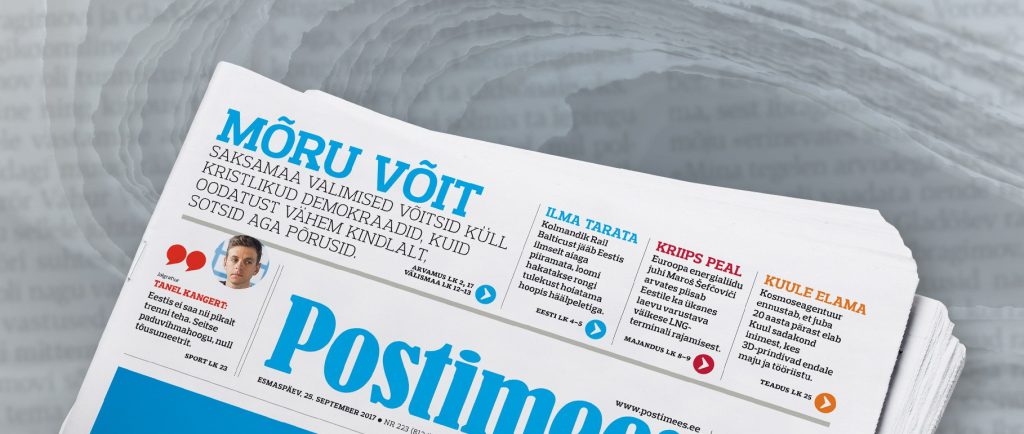Reporters Without Borders, an international organisation that conducts political advocacy on issues relating to freedom of information and freedom of the press, has expressed “extreme” concern about investigative journalism in Estonia in the light of a crisis in Postimees, the country’s leading newspaper.
Reporters Without Borders said in a 13 January release that it is “extremely concerned for the future of independent journalism in Estonia, where almost all of the investigative reporters and the opinion desk editors have left Postimees, the country’s leading daily newspaper, in the past few weeks, saying they no longer trust its management”.
According to the organisation, the latest journalists to leave the newspaper include Eva-Lotta Kivi and Karl-Eduard Salumäe, two members of its editorial section, who announced their departure on 2 January.
“The crisis at Postimees seems to be the culmination of a series of disagreements between its journalists and management that began in 2015, when Margus Linnamäe, a wealthy businessman who made his fortune in pharmaceutical retail, became the sole owner of the newspaper. Founded in 1857, Postimees has until recently been Estonia’s most respected newspaper.”
The end of strong investigative journalism
The most senior journalist to have departed is Merili Nikkolo, the executive publisher, who was fired on 23 December because of “differences about implementation of the newspaper’s vision”, according to the president of the board of governors. The head of investigative reporting, Holger Roonemaa, and five other journalists then decided to leave of their own accord. One of them, Martin Laine, said: “Nikkolo’s dismissal is a clear sign that the journalists and the board of governors are at loggerheads and cannot move forward together.”
“We are concerned that the exodus from Postimees could mark the end of strong investigative journalism in a country that has until now been seen as a model of press freedom,” Pauline Adès-Mével, the head of RSF’s EU and Balkans desk, said in a statement. “Its owner must prevent any interference by the board in the newspaper’s editorial content.”
With only one person left in the opinion section, and two in-house journalists left in the investigative section (and no permanent editor), two of the newspaper’s most important sections are now just idling.
“How will Postimees survive without all of this talent? What will become of the departing journalists as investigative reporting becomes scarcer in this small country with just 1.3 million inhabitants? This possible disappearance of this independent newspaper could prove disastrous for a country this size, one in which the media are already very polarized between the state-funded public radio and TV broadcaster and a major private-sector media company, Ekspress Grupp,” Reporters Without Borders said.
Blurring the distinction between journalism and advertising
The organisation already voiced concern about Linnamäe’s control of Postimees in April 2019, when its journalists said they had been under various forms of pressure to cover events linked to his other long list of business interests, which include a news agency, chains of restaurants, cinemas, bookstores, Estonia’s biggest chain of pharmacies, a TV channel and radio stations. “The Postimees website often refers to these other activities, blurring the distinction between journalism and advertising,” Reporters Without Borders noted.

In a response to the press organisation’s statement, Postimees said on its website that it “assures that we will continue to provide the public with the best possible journalism like before” and that the newspaper “has always valued journalism that is professional, objective and ethical”.
“Postimees has had better and worse times in its 162-year history, but journalism in its best tradition has always prevailed. The past year was turbulent, but we can assure that the newsroom has and will always continue to work as a united front for the sake of credibility and influence. The 125 journalists at Postimees are all at the service of our readers,” the newspaper said.
Promises fair coverage
“We do our work with both passion and freedom. Postimees will continue to do this both in investigative and opinion journalism. We will not stop covering all political, business and civic actors fairly.”
Reporters Without Borders is an international non-profit, non-governmental organisation based in Paris that conducts political advocacy on issues relating to freedom of information and freedom of the press. It has two primary spheres of activity: one is focused on internet censorship and the new media, and the other on providing material, financial and psychological assistance to journalists assigned to dangerous areas.
Estonia is ranked 11th out of 180 countries in the 2019 World Press Freedom Index.

